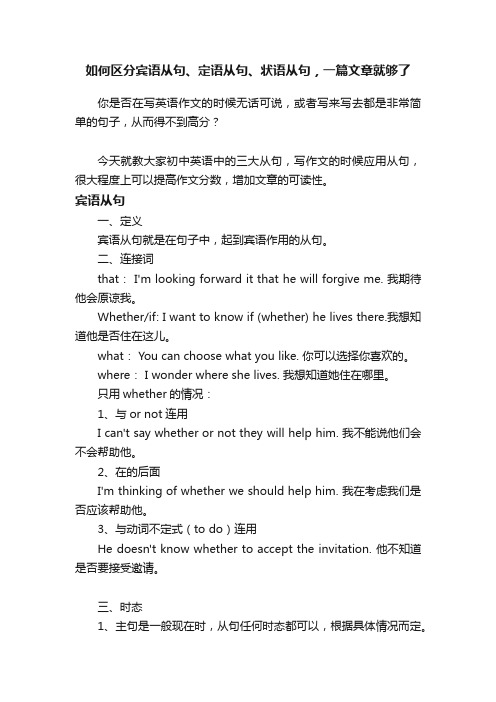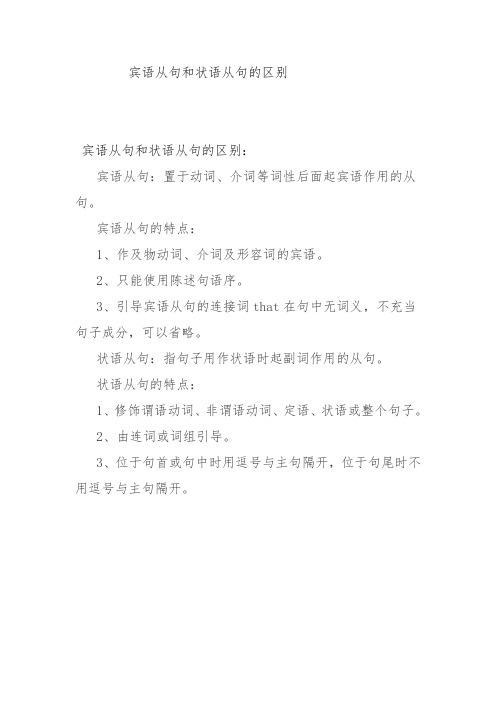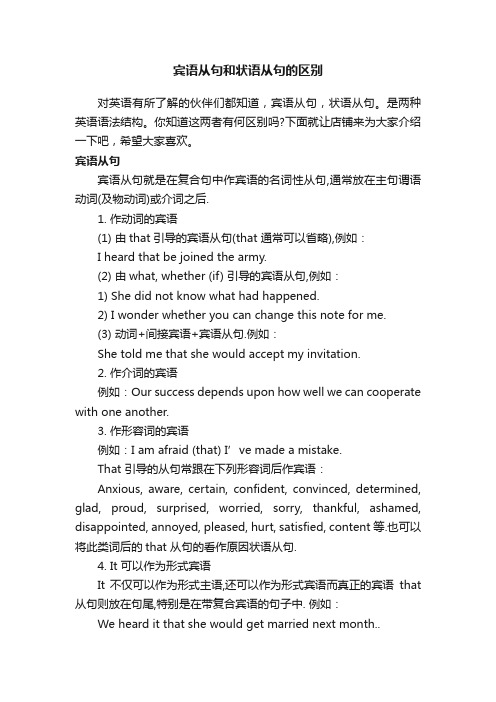宾语与状语从句
如何区分宾语从句、定语从句、状语从句,一篇文章就够了

如何区分宾语从句、定语从句、状语从句,一篇文章就够了你是否在写英语作文的时候无话可说,或者写来写去都是非常简单的句子,从而得不到高分?今天就教大家初中英语中的三大从句,写作文的时候应用从句,很大程度上可以提高作文分数,增加文章的可读性。
宾语从句一、定义宾语从句就是在句子中,起到宾语作用的从句。
二、连接词that: I'm looking forward it that he will forgive me. 我期待他会原谅我。
Whether/if: I want to know if (whether) he lives there.我想知道他是否住在这儿。
what: You can choose what you like. 你可以选择你喜欢的。
where: I wonder where she lives. 我想知道她住在哪里。
只用whether的情况:1、与or not连用I can't say whether or not they will help him. 我不能说他们会不会帮助他。
2、在的后面I'm thinking of whether we should help him. 我在考虑我们是否应该帮助他。
3、与动词不定式(to do)连用He doesn't know whether to accept the invitation. 他不知道是否要接受邀请。
三、时态1、主句是一般现在时,从句任何时态都可以,根据具体情况而定。
I wants to know what she has to take an examination.我想知道她有没有参加考试。
2、主句是一般过去时态,从句用相应的过去时态。
he said that he was a student. 他说他是一个学生。
he said that he would fly to Canada in a week. 他说他要飞到加拿大一个星期。
高三复习-状语从句和宾语从句区别

状语从句和宾语从句区别
宾语从句就是在复合句中作宾语的名词性从句,通常放在主句谓语动词(及物动词)或介词之后。
状语从句是用来修饰谓语动词、其它动词、定语、状语或整个句子的从句叫做状语从句。
在英语里面从句是有引导词引导的(跟在引导词后面),没有引导词的是主句。
首先说宾语从句,简单来说是原本一个句子中做宾语的地方用了一个句子,这个句子叫宾语从句。
动词和介词后面加宾语,所以动词介词后面跟宾语从句。
状语从句,分为时间,地点,目的,结果,原因,条件状语从句,翻译为当什么时候,在哪里,为了怎么怎么样。
I will build my house where there are many trees.此句子就是状语从句我会把房子建在有许多书的地方。
如何区分宾语从句和状语从句

南师附中新城初中 宋晴瑛
宾语从句:在句中作及物动词,介词或形容词的宾语。
一、考查宾语从句的引导词。 1. 由that引导的宾语从句。 that可以省略。例: He said (that) he wanted to stay at home. She doesn ' t know (that) she is seriously ill.
常用连接词 when,while,as,since,before,after, as soon as,until,till If,unless because,since,as, though,although so that, so … that, such …that
二、状语从句与主句的时态问题
1.时间状语从句、条件状语从句与主句的时态不一致。 (主句用将来时,而时间、条件状语从句用 一般现在 时)
If it d_o_e_s_n_'_t__r_a_i_n (not rain) tomorrow ,we _w_i_l_l__g_o___ (go) to climb the hill.
He __w_i_l_l__b_e_c_o_m_e__ (become) a soldier when he _g_r_o_w_s_(grow) up .
三. 考查宾语从句的时态 1. 如主句的时态是一般现在时,从句根据实际情况 选择各种时态。 (主现从不限) 如:Millie tells me she bought this purse yesterday. 2. 如主句的时态是一般过去时,从句则用相应的过去 时态。(主过从四过) 如:He told me that he was preparing for the sports meeting at that time. 3. 如宾语从句所陈述的是 客观真理,其时态用一般 现在时。如: Scientists have proved that the earth goes around the sun.
宾语从句与状语从句

04
宾语从句与状语从句的对比
结构和语序的对比
01
宾语从句的结构
02
状语从句的结构
宾语从句是一个完整的句子作为宾语 ,通常跟在动词、形容词或介词后面 。其语序与陈述句相同,即主语+谓 语+其他成分。
状语从句是一个完整的句子作为状语 ,修饰主句中的动词、形容词或整个 句子。其语序也遵循陈述句的语序。
宾语从句中的状语从句
宾语从句中也可以包含状语从句,用来进一 步说明宾语从句中的动作或状态。例如,“ 我告诉他,当我到达时给他打电话。”中, “当我到达时”是状语从句,修饰“打电话
”。
状语从句在宾语从句中的使用
要点一
状句中的独立状语从句
状语从句可以作为宾语从句的一部分,用来修饰宾语从句中 的动词或形容词。例如,“我知道他昨天来了。”中,“昨 天”是状语从句,修饰“来了”,同时整个句子作为“知道” 的宾语从句。
合并
有时可以将两个句子合并为一个句子,其中一个句子作为 宾语从句,另一个句子作为状语从句。例如,“他很累。 他不想吃饭。”可以合并为“因为他很累,所以他不想吃 饭。”,其中“他很累”是原因状语从句,“他不想吃饭” 是主句,“因为”是连接词。
06
总结与展望
宾语从句与状语从句的重要性和应用
重要性
宾语从句和状语从句是英语语法中的两大重要句型, 它们在句子中充当不同的成分,具有不同的语法功能 ,对于理解和运用英语语言具有重要意义。
构成
通常由从属连词引导一个完整的句子作为状语从句,从句中的主语和谓语保持正常的语 序。
状语从句的语序和时态
语序
状语从句的语序通常遵循正常的语序,即主 语在谓语之前。但在某些情况下,为了强调 或保持句子的平衡,从句中的成分可能会发 生变化。
宾语从句和状语从句的区别

宾语从句和状语从句的区别
宾语从句和状语从句的区别:
宾语从句:置于动词、介词等词性后面起宾语作用的从句。
宾语从句的特点:
1、作及物动词、介词及形容词的宾语。
2、只能使用陈述句语序。
3、引导宾语从句的连接词that在句中无词义,不充当句子成分,可以省略。
状语从句:指句子用作状语时起副词作用的从句。
状语从句的特点:
1、修饰谓语动词、非谓语动词、定语、状语或整个句子。
2、由连词或词组引导。
3、位于句首或句中时用逗号与主句隔开,位于句尾时不用逗号与主句隔开。
宾语从句和状语从句的区别

宾语从句和状语从句的区别对英语有所了解的伙伴们都知道,宾语从句,状语从句。
是两种英语语法结构。
你知道这两者有何区别吗?下面就让店铺来为大家介绍一下吧,希望大家喜欢。
宾语从句宾语从句就是在复合句中作宾语的名词性从句,通常放在主句谓语动词(及物动词)或介词之后.1. 作动词的宾语(1) 由that引导的宾语从句(that 通常可以省略),例如:I heard that be joined the army.(2) 由what, whether (if) 引导的宾语从句,例如:1) She did not know what had happened.2) I wonder whether you can change this note for me.(3) 动词+间接宾语+宾语从句.例如:She told me that she would accept my invitation.2. 作介词的宾语例如:Our success depends upon how well we can cooperate with one another.3. 作形容词的宾语例如:I am afraid (that) I’ve made a mistake.That 引导的从句常跟在下列形容词后作宾语:Anxious, aware, certain, confident, convinced, determined, glad, proud, surprised, worried, sorry, thankful, ashamed, disappointed, annoyed, pleased, hurt, satisfied, content 等.也可以将此类词后的that 从句的看作原因状语从句.4. It 可以作为形式宾语It 不仅可以作为形式主语,还可以作为形式宾语而真正的宾语that 从句则放在句尾,特别是在带复合宾语的句子中. 例如:We heard it that she would get married next month..5. 后边不能直接跟that 从句的动词这类动词有Allow, refuse, let, like, cause, force, admire, condemn, celebrate, dislike, love, help, take, forgive等.这类词后可以用不定式或动名词作宾语,但不可以用that引导的宾语从句.例如:I admire their winning the match. (right)I admire that they won the match. (wrong)6. 不可用that从句作直接宾语的动词有些动词不可用于“动词+间接宾语+that从句“结构中,常见的有Envy, order, accuse, refuse, impress, forgive, blame, denounce, advise, congratulate等.例如:He impressed the manager as an honest man. (right)He impressed the manager that he was an honest man. (wrong)7. 否定的转移若主句谓语动词为Think, consider, wuppose, believe, expect, fancy, guess, imagine等,其后的宾语从句若含有否定意义,一般要把否定词转移到主句谓语上,从句谓语用肯定式.例如:I don’t think this dress fits you well.(我认为这件衣服不适合你穿.)状语从句(Adverbial Clause)一状语从句的种类§ 1状语从句的种类用来修饰谓语动词、其它动词、定语、状语或整个句子的从句叫做状语从句.状语从句可分为:1.时间状语从句;(adverbial clause of time)2.地点状语从句;(adverbial clause of place)3.原因状语从句;(adverbial clause of cause)4.条件状语从句;(adverbial clause of condition)5.目的状语从句;(adverbial clause of purpose)6.让步状语从句;(adverbial clause of concession)7.比较状语从句;(adverbial clause of comparison)8.程度状语从句;(adverbial clause of degree)9.方式状语从句;(adverbial clause of manner)10.结果状语从句.(adverbial clause of result)§2状语从句的时态特点一般情况下,时间和条件状语从句的谓语动词一般用“一般现在时”表示“一般将来时”,用“现在完成时”表示“将来完成时”.例如:I will call you as soon as I arrive in Beijing. 我一到北京就给你打电话.(这是由as soon as引导的时间状语从句,从句中的谓语动词arrive是一般现在时,表示一般将来时,决不可用will arrive)As soon as I have finished this work, I will go home. 我一完成此工作,就回家.(从句中的谓语动词用现在完成时have finished,表示将来完成时,决不可用will have finished)If he comes back, please let me know.如果他回来了,请通知我.(从句中的谓语动词用comes back,表示一般将来时,决不可用will come back)二时间状语从句§3时间状语从句(adverbial clause of time)1.由when, while, as引导的时间状语从句.例如:When you think you know nothing, then you begin to know something.当你以为自己一无所知的时候,你就是在开始知道一些事物了.When truth is buried under the ground it grows, it chokes, it gathers such an explosive force that on the day it bursts out , it blows up everything with it.当真理被埋在地下的时候,它在生长,它感到压抑,它蓄存着这么一种爆炸性力量,一旦冒出,它就会炸破一切!Strike while the iron is hot. 趁热打铁.Will you watch my clothes while I have a swim. 我游泳的时候,请你照看一下我的衣服.You can feel the air moving as your hand pushes through it. 当你的手在空气中挥动的时候,你就能感觉到空气在流动.Our headmaster laughed as she spoke.我们的校长边谈边笑.【区别】when, while和as的区别:when引导的从句的谓语动词可以是延续性的动词,又可以是瞬时动词.并且when有时表示“就在那时”.例如:When she came in, I stopped eating.她进来时,我在吃饭.(瞬时动词)When I lived in the countryside, I used to carry some water for him.当的住在农村时,我常常为他担水.(延续性的动词)We were about to leave when he came in.我们就要离开,就在那时他进来了.While引导的从句的谓语动作必须是延续性的,并强调主句和从句的动作同时发生(或者相对应).并且while有时还可以表示对比.例如:While my wife was reading the newspaper, I was watching TV. (was reading是延续性的动词,was reading和was watching同时发生)I like playing football while you like playing basketball.我喜欢踢足球,而你喜欢打篮球.(对比)As表示“一边……一边”,as引导的动作是延续性的动作,一般用于主句和从句动作同时发生;as也可以强调“一先一后.例如:We always sing as we walk.我们总是边走边唱.(as表示“一边……一边”)As we was going out, it began to snow.当我们出门时,开始下雪了.(as强调句中两个动作紧接着先后发生,而不强调开始下雪的特定时间)2.由before和after引导的时间状语从句.注意before引导的从句不再用否定式的谓语,并且当before引导的从句位于主句之后,有时译成“就,才”.还要注意主句和从句之间的时间关系.当主句用将来时,从句总是用现在时;如果before引导的从句谓语用的是过去时,则主句动词多用过去完成时,这样以便体现动作发生的先后.After表示主句动作发生在从句动作之后.主句和从句的动作的时间关系正好与before引导的从句相反.例如:It will be four days before they come back. 他们要过四天才能回来.Einstein almost knocked me down before he saw me.爱因斯坦几乎把我撞倒才看到我.My father had left for Canada just before the letter arrived.我父亲恰好在信到之前去加拿大了.They had not been married four months before they were divorced. 他们结婚还不到四个月就离婚了.After you think it over, please let me know what you decide.你仔细考虑过以后,告诉我你是怎样决定的.After we had finished the work, we went home.完成工作之后,我们回家了.(从句用过去完成时,主句用一般过去时)3.由till或until引导的时间状语从句.till和until一般情况下两者可以互换,但是在强调句型中多用until.并且要注意的是:如果主句中的谓语动词是瞬时动词时,必须用否定形式;如果主句中的谓语动词是延续性动词时,用肯定或否定形式都可以,但表达的意思不同.例如:I didn't go to bed until(till) my father came back.直到我父亲回来我才上床睡觉.It was not until the meeting was over that he began to teach me English.直到散会之后他才开始教我英语.I worked until he came back.我工作到他回来为止.I didn't work until he came back.他回来我这才开始工作.Please wait until I arrived.在我到达之前请等我.4.由since引导的时间状语从句. since引导的从句的谓语动词可以是延续性的动词,又可以是瞬时动词.一般情况下,从句谓语动词用一般过去时,而主句的谓语动词用现在完成时.但在It is +时间+since从句的句型中,主句多用一般现在时.例如:I have been in Beijing since you left. 自从你离开以来,我一直在北京了.Where have you been since I last saw you? 自上次我和你见面以后,你到哪里去了?It is four years since my sister lived in Beijing. 我妹妹不在北京住有四年了.It is five months since our boss was in Beijing.我们老板离开北京有五个月了.5.由as soon as, immediately, directly, instantly, the moment, the instant, the minute, 等引导的时间状语从句.这些连词都表示“一……就”.例如:I will go there directly I have finished my breakfast. 吃完早饭,我立即到那里去.The moment I heard the news, I hastened to the spot.我一听到消息,马上赶到了出事地点.As soon as I reach Canada, I will ring you up. 我一到加拿大,就给你来电话.【注意】hardly(scarcely, rarely)…when / before, no sooner…than相当于as soon as之意.主句用过去完成时,从句用一般过去时.当hardly, scarcely, rarely和no sooner位于句首时,主句应用倒装语序.例如:He had no sooner arrived home than he was asked to start on another journey. 他刚到家,就被邀请开始另一旅程.No sooner had the sun shown itself above the horizon than he got out of bed to commence work.太阳刚从地平线上升起,他就起床劳动去了.Hardly had I sat down when he stepped in.我刚坐下,他就进来了.He had hardly fallen asleep when he felt a soft touch on his shoulder.这个阿拉伯人刚要入睡就感到肩膀上被轻轻一触.6.由by the time引导的时间状语从句.注意时态的变化:在一般情况下,如果从句的谓语动词用一般过去时,主句的谓语动词用过去完成时;如果主句的谓语动词用一般现在时,主句的谓语动词用将来完成时.例如:By the time you came back, I had finished this book.到你回来时,我已经写完这本书了.By the time you come here tomorrow, I will have finished this work. 你明天来这儿的时候,我将已经完成此工作了.7.由each time, every time和whenever引导的时间状语从句.例如:Each time he came to Harbin, he would call on me. 他每次来哈尔滨,总是来看我.Whenever that man says“To tell the truth”, I suspect that he's about to tell a lie.每当那个人说“说实在话”的时候,我猜想他就要说谎了.You grow younger every time I see you. 每次遇到你,见你更年轻了.8.由as long as和so long as引导的时间状语从句.这两个连词表示“有多久……就多久”.例如:You can go where you like as long as you get back before dark. 你可以随意到哪里去,只要在天黑以前回来就行.I will fight against these conditions as long as there is a breath in my body! 只要我一息尚存,我就要反对这种境况.三地点状语从句§4地点状语从句 (adverbial clause of place)地点状语从句一般由连接副词where, wherever等引导,已经形成了固定的句型,例如:句型1:Where+地点从句,(there)+主句.【注意】此句型通常译成“哪里……哪里就……”;主句在从句后面时,there可用可不用;如果主句在从句的前面时,一般都不用there.例如:Where there is no rain, farming is difficult or impossible.在没有雨水的地方,耕作是困难的,或根本不可能的.They were good persons. Where they went, there they were warmly welcomed. 他们都是好人.因此他们走到哪里都受到热烈欢迎.You should have put the book where you found it. 你本来应该把书放回原来的地方.Where the Communist Party of China goes, there the people are liberated.哪里有了中国共产党,哪里人民得解放.句型2:Anywhere/ wherever+地点从句,+主句.【注意】anywhere本身是个副词,但是,常可以引导从句,相当于连词,意思相似于wherever, anywhere引导的从句可位于主句之前,也可以位于主句之后. 而wherever本身就是个连词,表示“在何处,无论何处”.例如:Wherever the sea is , you will find seamen.有海就有海员.猜你喜欢。
宾语从句、状语从句

2. 如果主句的时态是一般过去时, 宾语从句只能用相应的过去时态 (一般过去时, 过去进行时, 过去 将来时,过去完成时)。例如: He asked what time it was. He told me that he was preparing for the sports meeting. He asked if you had written to Peter.
1.—Excuse me .Could you tell me_____ I can get to the Space Museum? --Of course. You can take bus No.1. A. where B. how C. if D. why 答案:B
2. Your T-shirt is so cool. Could you tell me ________? A. where you buy it B. where do you buy it C. where you bought it D. where did you buy it 答案:C
(3)“祈使句 + and (or)+ 陈述句” 在意 思上相当于一个带有条件状语从句的复 合句。例如: Hurry up, or you’ll be late. =If you don’t hurry up, you’ll be late. 3. 原因状语从句 (1)原因状语从句通常由because, since, as引导。例如: He didn’t come to school because he was ill.
(2)because表示直接原因,语气最强。 As和since语气较弱,一般用来表示明 显的原因。由as和since引导的原因状 语从居多放在句首。例如: ------Why aren’t going there? ------Because I don’t want to. As he has no car, he can’t get there easily. Since we have no money, we can’t buy it. (3)because和so不能同用在一个句子里。
宾语从句,状语从句,定语从句,表语从句的详细讲解及例句

当我们学习语法时,我们常常会遇到几种从句,包括宾语从句、状语从句、定语从句和表语从句。
下面逐个进行详细讲解,并给出相应的例句。
1. 宾语从句(Object Clause):宾语从句用来做主句中的宾语。
它通常由连接词引导,如that, if, whether, what, where, who, whom, whose等。
例句:- I don't know what he wants.(我不知道他想要什么。
)- She asked if he could come to the party.(她问他是否能来参加派对。
)- They wonder where we are going.(他们想知道我们要去哪里。
)2. 状语从句(Adverbial Clause):状语从句用来修饰主句中的动词、形容词、副词,表示时间、地点、原因、条件、结果等。
它通常由连接词引导,如when, while, because, if, although, since等。
例句:- We will go hiking if the weather is good.(如果天气好,我们将去远足。
)- He studied hard until he passed the exam.(他学习努力直到通过考试。
)- Although it was raining, they still went out.(虽然下雨了,他们仍然出去了。
)3. 定语从句(Relative Clause):定语从句用来修饰主句中的名词或代词,对其进行限定或说明。
它通常由关系代词引导,如that, which, who, whom, whose等。
例句:- The book that I bought yesterday is very interesting.(我昨天买的那本书很有趣。
)- The person who is talking to Mary is my brother.(正在和玛丽说话的那个人是我哥哥。
- 1、下载文档前请自行甄别文档内容的完整性,平台不提供额外的编辑、内容补充、找答案等附加服务。
- 2、"仅部分预览"的文档,不可在线预览部分如存在完整性等问题,可反馈申请退款(可完整预览的文档不适用该条件!)。
- 3、如文档侵犯您的权益,请联系客服反馈,我们会尽快为您处理(人工客服工作时间:9:00-18:30)。
宾语从句I don't know _________ he will come tomorrow. _________ he comes, I'll tell you.A. if; WhetherB. whether; WhetherC. if; ThatD. if; If2. I don't know _________ the day after tomorrow.A. when does he comeB. how will he comeC. if he comesD. whether he'll come3. Could you tell me _________ the nearest hospital is?A. whatB. howC. whetherD. where4. Could you tell me _________ the radio without any help?A. how did he mendB. what did he mendC. how he mendedD. what he mended5. I want to know _________.A. whom is she looking afterB. whom she is lookingC. whom is she lookingD. whom she is looking after6. Do you know where _________ now?A. he livesB. does he liveC. he livedD. did he live7. Do you know what time _________?A. the train leaveB. does the train leaveC. will the train leaveD. the train leaves8. I don't know _________. Can you tell me, please?A. how the two players are oldB. how old are the two playersC. the two players are how oldD. how old the two players are9. The small children don't know _________.A. what is their stockings inB. what is in their stockingsC. where is their stockings inD. what in their stockings10. I can't understand _________.A. what does Christmas meanB. what Christmas does meanC. what mean Christmas doesD. what Christmas means状语从句状语从句练习题:1.I’ll let you know ____ he comes back.A. beforeB. becauseC. as soon asD. although2. She will sing a song ____ she is asked.A. ifB. unlessC. forD. since3. We will work ____ we are needed.A. wheneverB. becauseC. sinceD. wherever4. Read it aloud _____ the class can hear you.A. so thatB. ifC. whenD. although5._____ you go, don't forget your people.A. WheneverB. HoweverC. WhereverD. Whichever6. It is about ten years _____ I met you last.A. sinceB. forC. whenD. as7. They will never succeed, _____ hard they try.A. becauseB. howeverC. whenD. since8. _____ still half drunk, he made his way home.A. WhenB. BecauseC. ThoughD. As9. _____ she was very tired, she went on working.A. AsB. AlthoughC. EvenD. In spite of10. Busy _____ he was, he tried his best to help you.A. asB. whenC. sinceD. for11. I learned a little Russian _____ I was at middle school.A. thoughB. althoughC. as ifD. when12. _____ we got to the station, the train had left already.A. IfB. UnlessC. SinceD. When13. _____ the rain stops, we' 11 set off for the station.A. BeforeB. UnlessC. As soon asD. Though14. She was _____ tired _____ she could not move an inch.A. so, thatB. such, thatC. very, thatD. so, as15. We didn’t go home _____ we finished the work.A. sinceB. untilC. becauseD. though16. I'll stay here _____ everyone else comes back.A. even ifB. as thoughC. becauseD. until17. Although it's raining, _____ are still working in the field.A. theyB. but theyC. and theyD. so they18. Speak to him slowly _____ he may understand you better.A. sinceB. so thatC. forD. because19. You'll miss the train ______ you hurry up.A. unlessB. asC. ifD. until20. When you read the book, you' d better make a mark _____ you have any questions.A. at whichB. at whereC. the placeD. where21. We'd better hurry ______ it is getting dark.A. andB. butC. asD. unless22. I didn' t manage to do it _____ you had explained how.A. untilB. unlessC. whenD. before23._____ he comes, we won't be able to go.A. WithoutB. UnlessC. ExceptD. Even24. I hurried _____ I wouldn't be late for class.A. sinceB. so thatC. as ifD. unless25. _____ I catch a cold, I have pain in my back.A. Every timeB. ThoughC. EvenD. Where26. What's the matter _____ they still haven't answered the telegram?A. whenB. thatC. thoughD. however27. Bring it nearer _____ I may see it better.A. althoughB. even thoughC. so thatD. since28. You may arrive in Beijing early _____ you mind taking the night train.A. thatB. thoughC. unlessD. if29. Helen listened carefully _____ she might discover exactly what she needed.A. in thatB. in order thatC. in caseD. even though30. More people will eat out in restaurants _____ they do today.A. thanB. whenC. whileD. as31._____ hard she tries, she can hardly avoid making mistakes in her homework.A. MuchB. HoweverC. AsD. Although32. Poor _____ it may be, there is no place like home, _____ you may go.A. as; whereverB. though; wheneverC. in spite of; whenD. that; wherever33. The child was __ immediately after supper.A. enough tired to go to bedB. too tired to go to bedC. so tired that he went to bedD. very tired, he went to bed34. The history of nursing __ the history of man.A. as old asB. is old thanC. that is as old asD. is as old as35. _____ born in Chicago, the author was famous for his stories about New York.A. SinceB. OnceC. WhenD. Although36._____ we stood at the top of the building, the people below were hardly visible.A. AsB. AlthoughC. UnlessD. In spite of37. Scarcely was George Washington in his teens _____ his father died.A. thanB. asC. whileD. when38. _____ David goes, he is welcome.A. WhicheverB. HoweverC. WhereverD. Whatever39. The house stood _____ there had been a rock.A. whichB. at whichC. whenD. where40. Small _____ it is, the pen is a most useful tool.A. becauseB. soC. ifD. as41. After the new technique was introduced, the factory produced _____ tractors in 1988 as the year before.A. as twice manyB. as many twiceC. twice as manyD. twice many as42. The piano in the other shop will be _____, but _____.A. cheaper; not as betterB. more cheap; not as betterC. cheaper; not as goodD. more cheap; not as good43. John plays football _____, if not better than, David.A. as wellB. as well asC. so wellD. so well as44. Although he is considered a great writer,A. his works are not widely readB. but his works are not widely readC. however his works are not widely readD. still his works are not widely read45. ___ the day went on, the weather got worse.A. WithB. SinceC. WhileD. As46.—What was the party like?—Wonderful. It' s years _____ I enjoyed myself so much.A. afterB. whenC. beforeD. since47. It was not _____ she took off her dark glasses _____ I realized she was a famous film star.A. when; thatB. until; thatC. until; whenD. when; then48. If we work with a strong will, we can overcome any difficulty, _____ great it is.A. whatB. howC. howeverD. whatever49. After the war, a new school building was put up _____ there had once been a theatre.A. thatB. whereC. whichD. when50._____, Mother will wait for him to have dinner together.A. However late is heB. However he is lateC. However is he lateD. However late he is。
